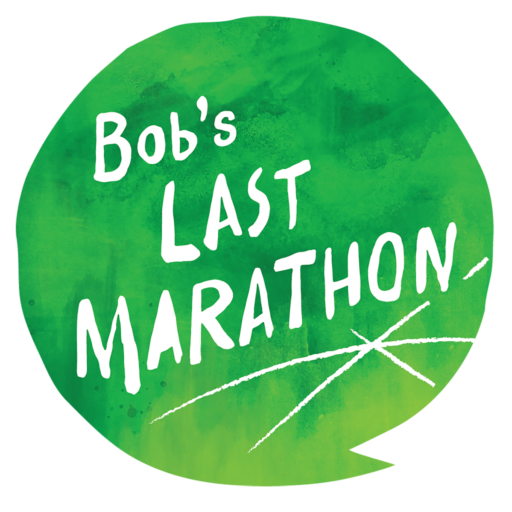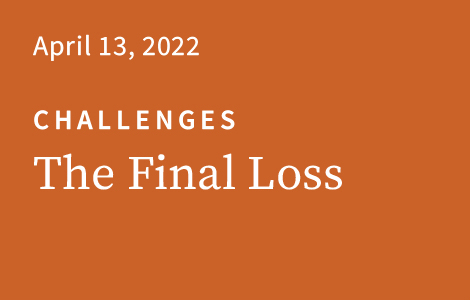Transcript
The Final Loss
Sometimes Alzheimer’s is referred to as the long goodbye. Once diagnosed, a person can live with dementia for ten or more years, experiencing a steady stream of cognitive and functional losses along the way. Yet, families still experience the final loss as a surprise. Stanley and Eve had been married for 40 years when Eve was diagnosed with Alzheimer’s disease. Eight years later, Eve was in her home receiving end-of-life comfort care. She was in a hospital bed and needed a Hoyer lift to transfer, and she spoke and ate very little. When the hospice nurse told Stanley that she would likely die within the week, Stanley was bewildered. He was still not ready for the final loss of his beloved wife. Stanley is not unlike other people I support, individually or in groups: Even though the Eve he married had been gone for years, he could not imagine who he’d be without her.
Since 2008 I’ve been working as a licensed clinical social worker supporting caregivers of family members with dementia. Over time my work has shifted from caregiving to loss. Currently I facilitate a group focused on loss. It was initially a support group for ten caregivers, and they’ve been together for many years. Over time, as their spouses progressed to the final stages of disease and some began to die, we were faced with a decision: Do we keep the group together, or become two groups—one for people still caring for their loved ones and one for those who have lost theirs? The answer was easy for them: They did not want to break up, and so we shifted the focus from caregiving to loss, though three people still have spouses in the late stages of dementia. Now, their conversations revolve around loss. Katie, Louise, James, and the others whose spouses have died use the group to share their stories of loneliness—how they get through anniversaries, birthdays, and other significant “firsts” since the loss; as well as their stories of resilience—how they are able to get up each morning and face the day without their spouses. Kenny, Maureen, and Dalia still have their spouses, but they are anticipating the end and they come to the group trying to imagine what their futures will look like, while simultaneously experiencing the ongoing losses of their spouses, who continue to decline.
Clinical psychologist Barry Jacobs gave a podcast earlier in this season about the ambiguous losses experienced by Alzheimer’s caregivers who are adjusting to what we call “non-finite” loss, when the person is still here physically but absent emotionally or psychologically. Today’s episode is about finite losses. We live inside our stories, and, like Stanley, once we’ve written someone into our narrative, we experience their death as a crisis of meaning. The loss shatters our assumptions about the way the world is supposed to work, and it threatens our sense of identity and purpose. Alzheimer’s disease robs people of their memories and abilities over time, and family and other loved ones are forced to adjust to these ongoing changes, to the very end. When there is a death, there are often mixed emotions—combining shock, anger, sadness, and sometimes relief. In my role as a grief therapist, I support families by helping them accept the loss and begin the process of healing by creating new stories.
Grief is a series of intense physical and psychological responses that occur following a loss. It is a normal, adaptive response to a loss. Grief counselors are tasked with understanding what affects the way their clients experience loss, helping grievers reconstruct meaning in their lives, facilitating continuing bonds with the deceased, and coaching them as they shape their identity without their loved one in the physical world. The philosopher Friedrich Nietzsche wrote, “He who has a why to live for can bear with almost any how.” When faced with a significant loss, grievers must find their why and create a new sense of purpose or identity. How do they do this? They work on constructing new meanings of their lives, of events, of circumstances, and of their emotional reactions, and they author their own new story, and the story of the deceased. Stanley, for example, came from a family that valued work above all, and work is what he did. Eve was the partner responsible for their social life and making their house a home. She kept things exciting and beautiful. Without her, he was lost, and our work revolved around identifying things he learned from her so that he could incorporate her back into his life through choices he had deferred since her death, like how to replace a sofa or make time to enjoy the company of family and friends. Ideally this process is done in tandem with a counselor or chaplain, and it takes time. The first 6 to 12 months after the loss can be disorienting. It’s when people like Stanley struggle to acknowledge the reality of the death and eventually to accept this reality while embracing—or tolerating—the pain of the loss, which can feel unbearable. Even though loss is inevitable, and grief is something we all experience, when we go through the process, we can feel alone. Working with a counselor can help survivors understand the impact of the loss on their lives and find ways to honor and celebrate the deceased while learning how to live without them. Some people feel like they can’t go on after the loss, and some feel like they’re moving on a little too well and experience guilt because of this.
Eight months ago a client I’ll call Gregory lost his spouse of 55 years. He recently told me that he felt like he was at a fork in the road. If he went in one direction, he would resign himself to the loss. He would retreat and withdraw, biding the time until he and his spouse are reunited. But if he went in the other direction, he could begin to imagine a meaningful life, integrating back into community life and using his talents to serve a purpose. One is a story of hopelessness; the other, of hope. Gregory is drawn toward hope, though at times he feels like ending it all. Gregory’s experience illustrates a theory of grief called the dual process model.
An assumption of the dual process model is that healthy grieving means engaging in a dynamic process of oscillating between loss-oriented and restoration-oriented coping. A griever will go back and forth between confronting the loss by feeling the pain, and then avoiding the loss by allowing themselves to experience moments of joy. It’s like there are two tracks, and the griever keeps switching, at times ruminating on emotions associated with the deceased, concentrating on how life had been prior to the loss, focusing on the circumstances surrounding the death, and then at other times focusing on the acquisition of their new roles, creating a new life without the deceased, and relating to friends and family in a new way. Gregory continues to jump from track to track, experiencing periods of both pain and joy, and learning how to live meaningfully in this world without his spouse.
This is a process through which people can begin to find meaning in the loss. Grief theorists emphasize the importance of telling one’s story as a source of meaning—making connections between the past, the present, and the future. It’s also important to consider attitude as a source of meaning. We all have the ability to choose our attitude or stance in the face of suffering. Viktor Frankl, who survived Nazi death camps, argued that while we cannot avoid suffering, we can choose how we cope with it, find meaning in it, and move forward. Frankl’s memoir, Man’s Search for Meaning, is a source of inspiration for many as they go through loss. The sources of meaning we create can become lighthouses in the distance, helping people transcend suffering. We may never get over the loss of a loved one, but we will, hopefully, learn to live with and tolerate the pain of the loss.
While grief is distinct from depression, it can turn into depression if it is not processed. Individual grief therapy is a way to help people move through the pain of the loss because a therapist is a compassionate person bearing witness to the pain and serving as a guide. Grief groups are another option. Listening to others’ stories of suffering and resilience and letting them listen to yours can result in feeling less alone. There is power in telling your story and affirming the stories of others. The novelist William Faulkner said, “Given a choice between grief and nothing, I’d choose grief.” I share this quote with you as a reminder that we grieve because we love.
Felicia Greenfield, MSW, LCSW
Executive Director
Penn Memory Center
www.pennmemorycenter.org

